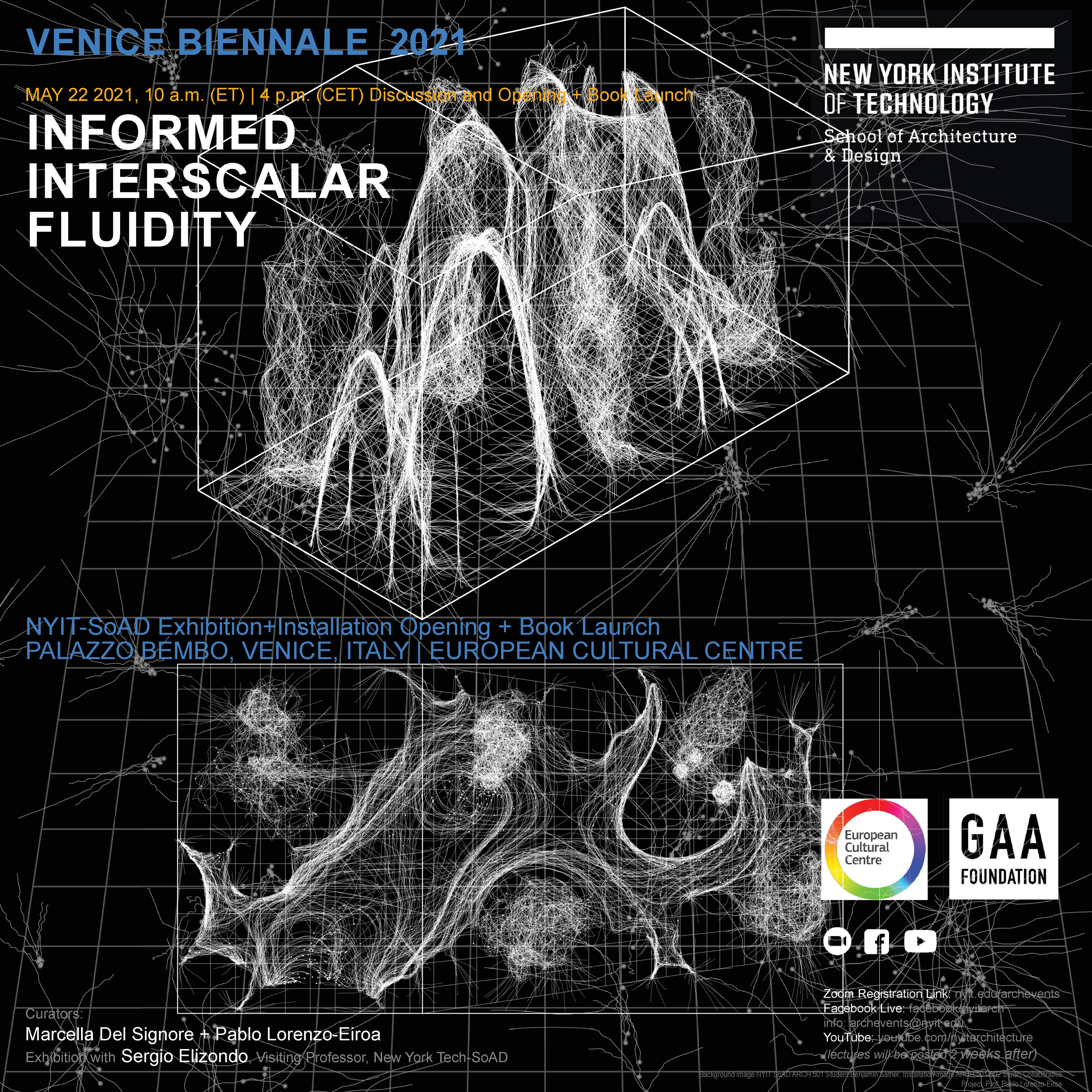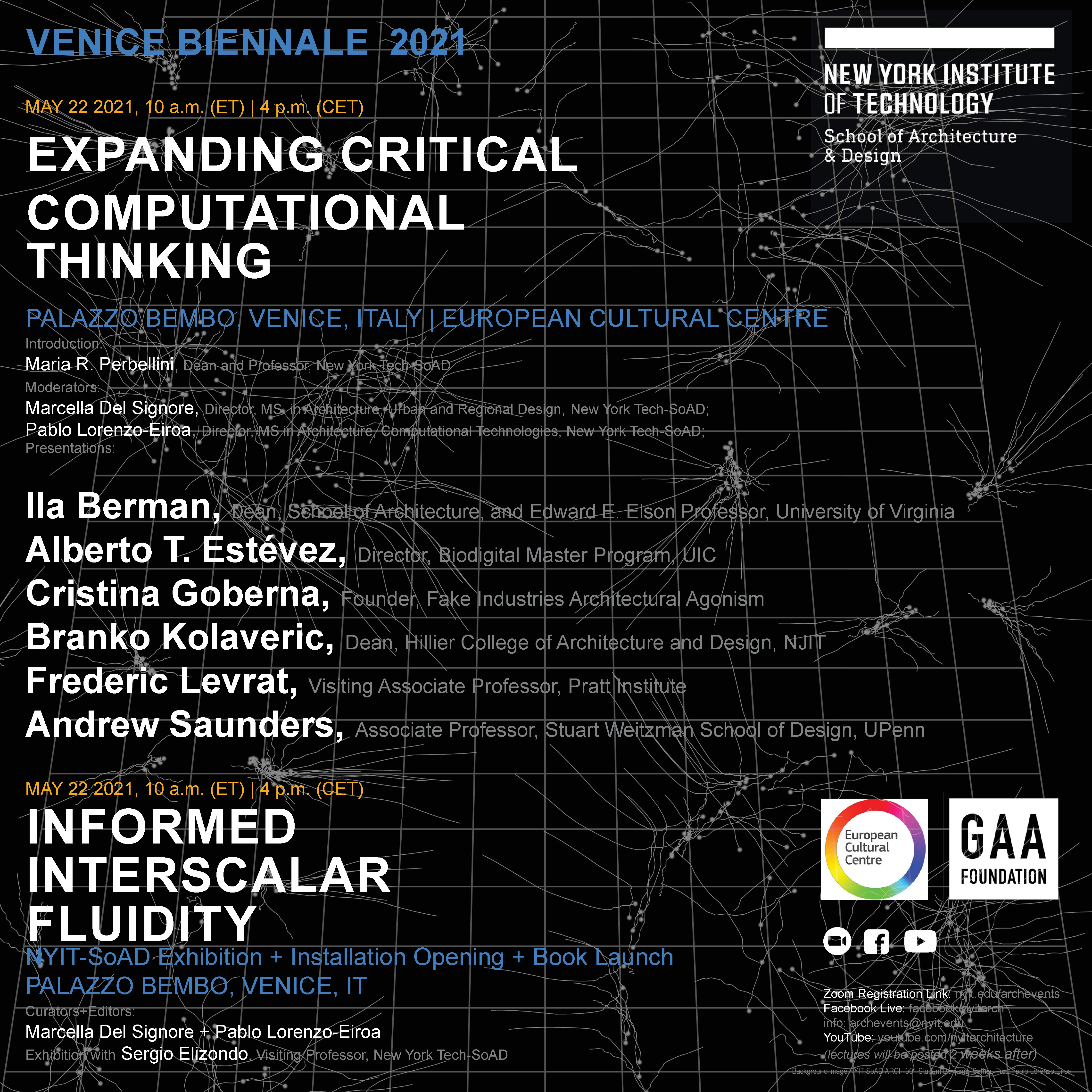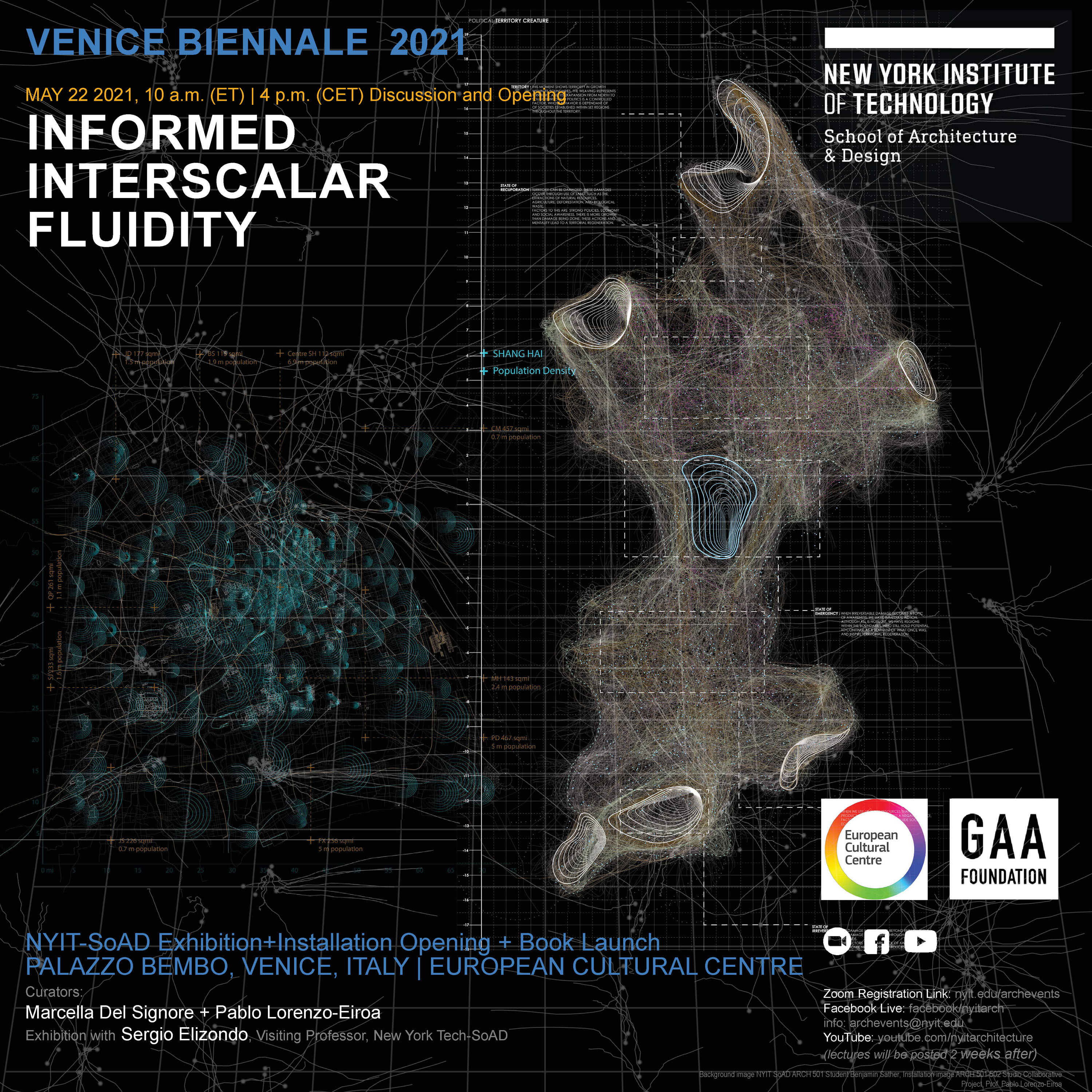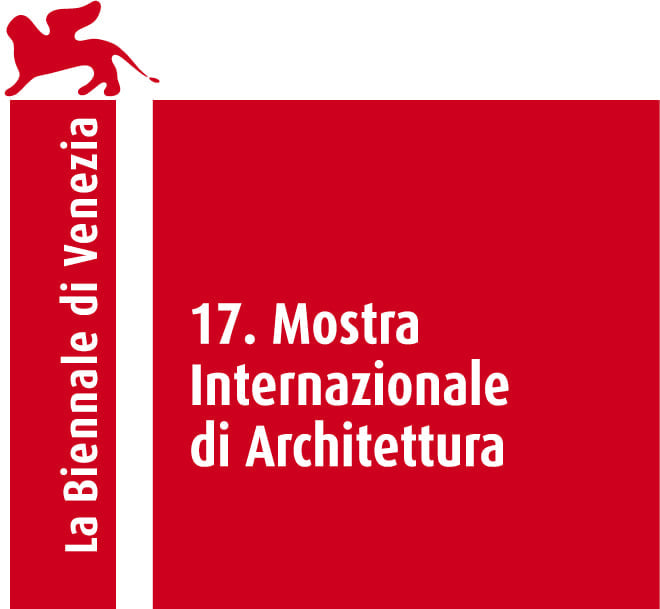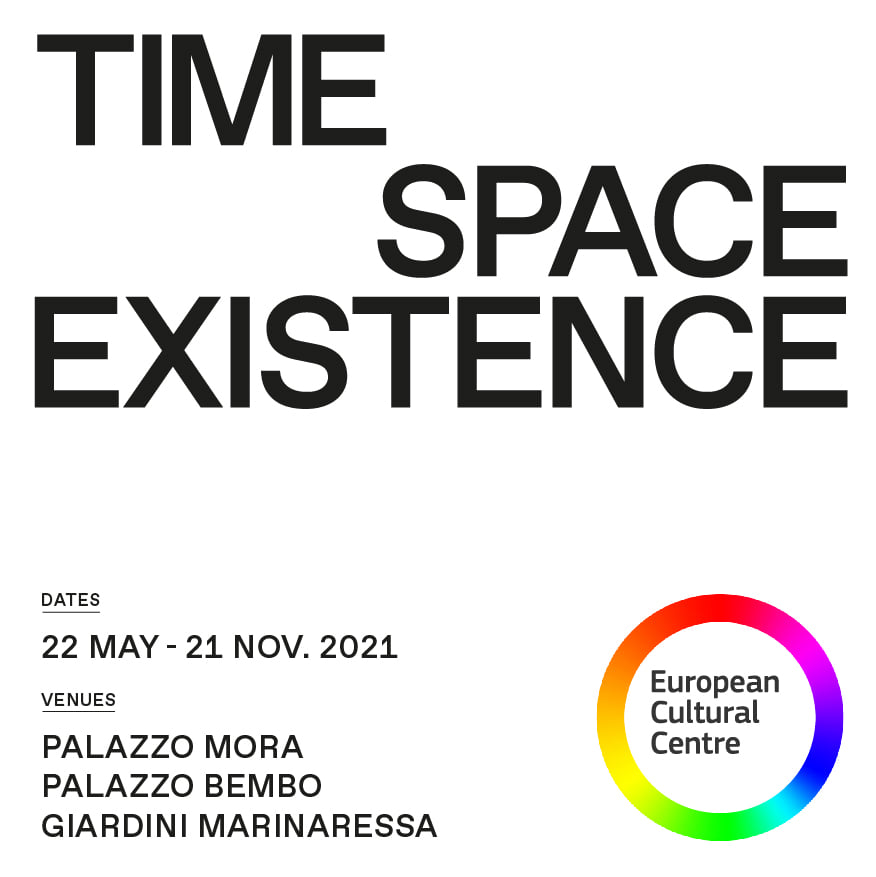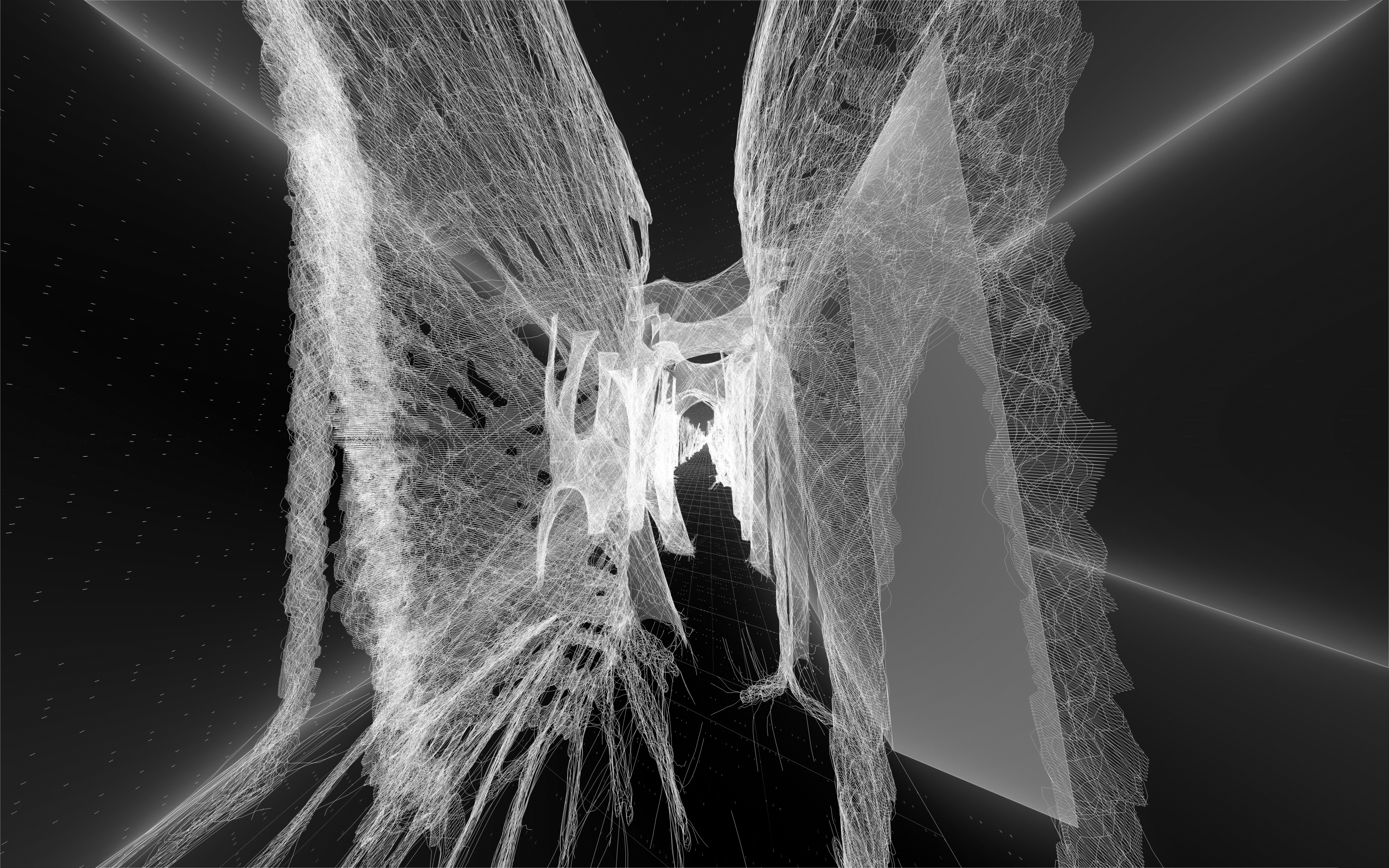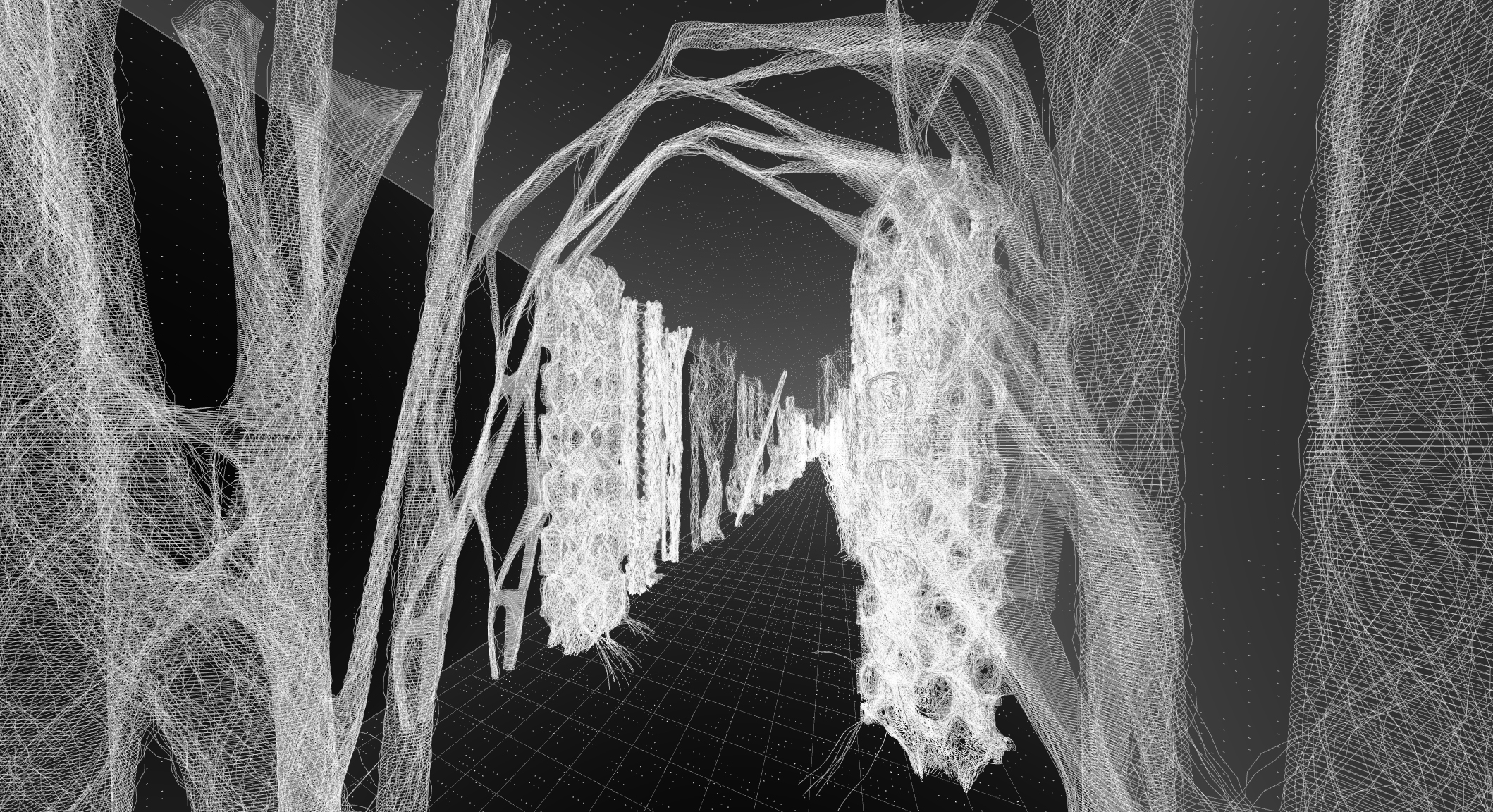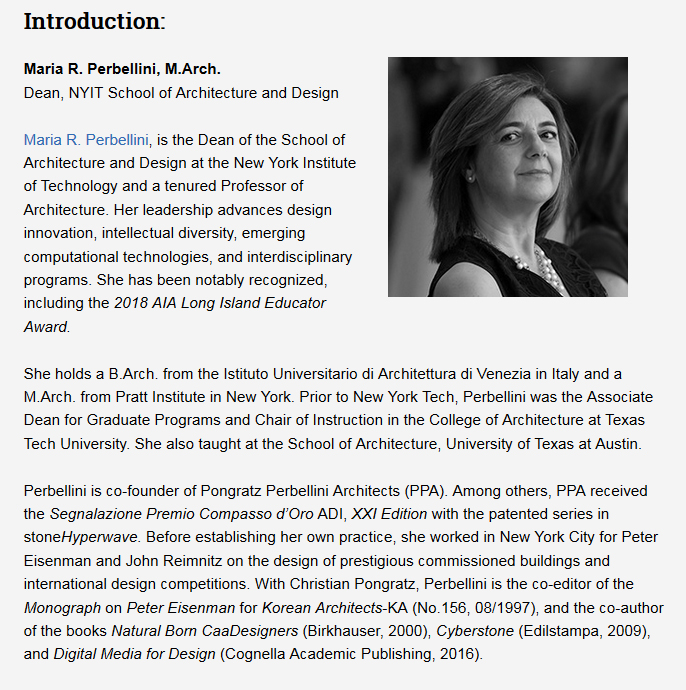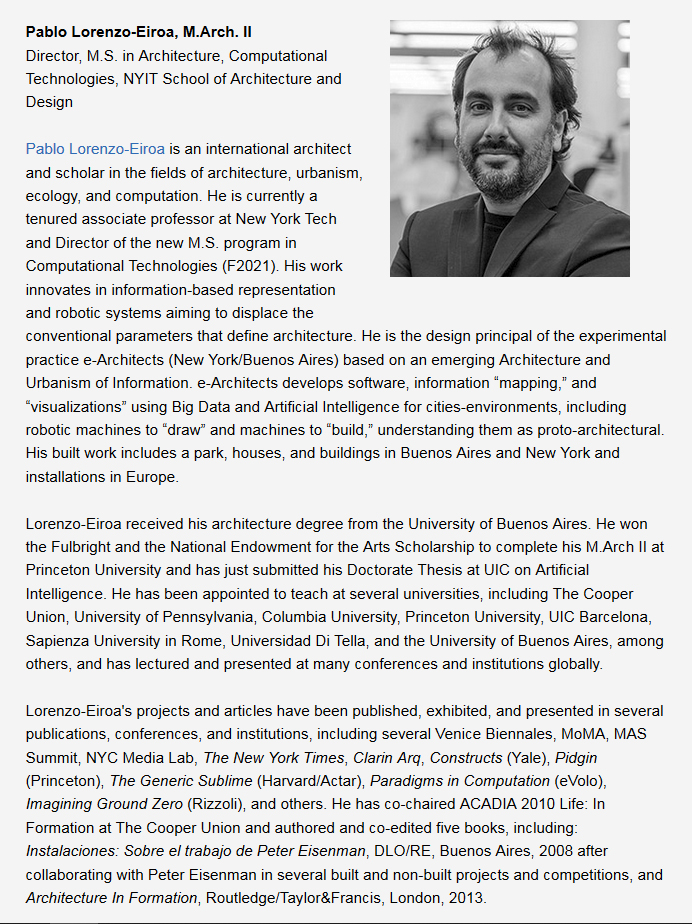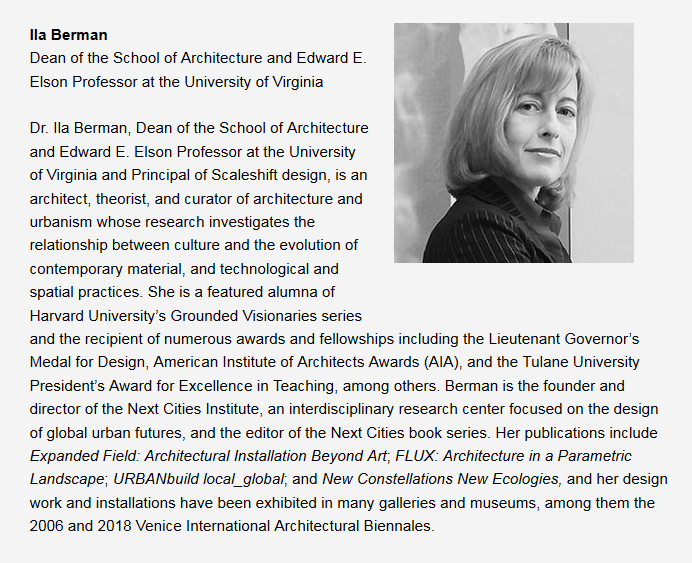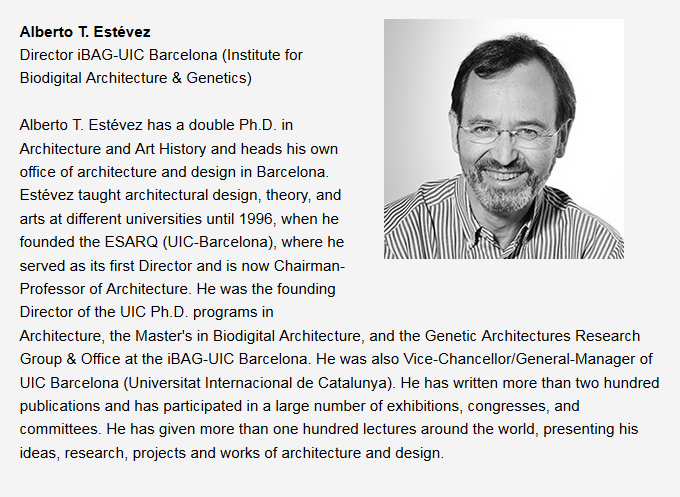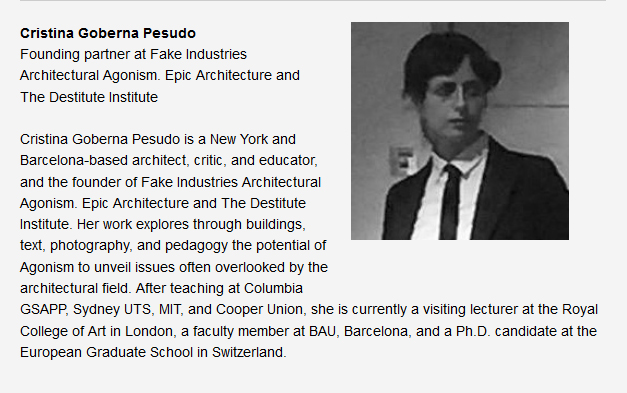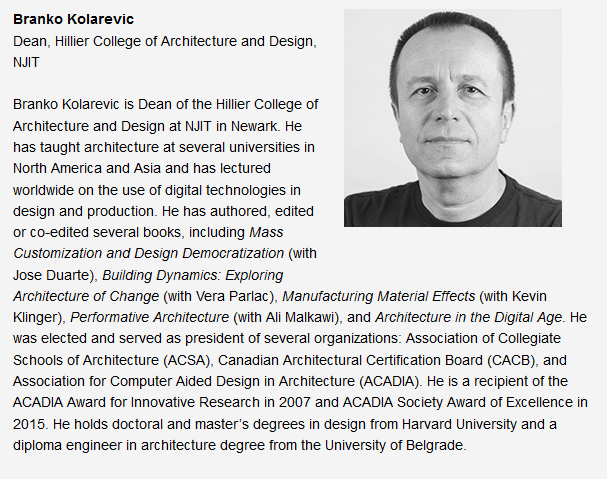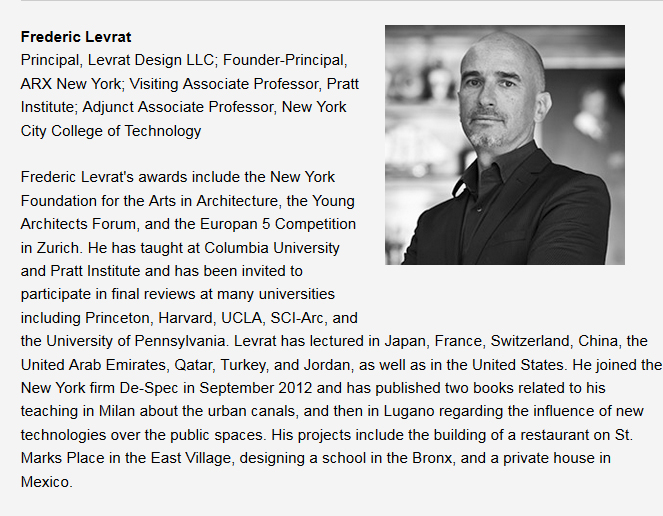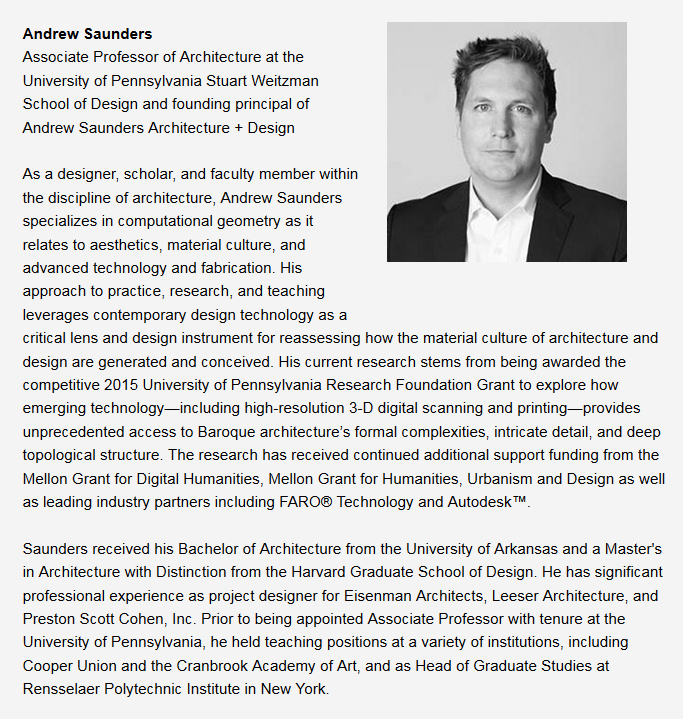Architecture Computational Technologies
Explore design research at the frontiers of architecture through experimentation in computational design, robotic systems applied to fabrication and interactivity, and materiality. For more information please contact ms.act@nyit.edu
Venice Biennale 2021: Informed Interscalar Fluidity - Critical Computational Thinking
MAY 22 2021 , 10am-12pm (EDT) | 4pm-6pm (IT)
THEME: 2021 Venice Biennial Architecture exhibition “Time Space Existence”
TITLE: Expanding Critical Computational Thinking
Palazzo Bembo, European Cultural Centre, Venice IT
New York Institute of Technology, School of Architecture and Design
at the 17th International Architecture Biennale 2021 + Virtual Italian Pavilion
“Expanding Critical Computational Thinking” Roundtable discussion will be centered on the themes that the “INFORMED INTERSCALAR FLUIDITY” exhibition and installation propose.
About Informed Interscalar Fluidity
A collection of works by NYIT School of Architecture and Design thesis students.
Part of the “Time Space Existence” exhibition presented by the European Cultural Centre running from May 22 – November 21 at Palazzo Bembo, Venice, IT. It is an official collateral event of the 17th International Architecture Biennale 2021.
The exhibition is curated by Associate Professor, Marcella Del Signore with Visiting Assistant Professor, Sergio Elizondo. The site-specific installation is curated by Associate Professor Pablo Lorenzo-Eiroa. Informed Interscalar Fluidity expands computational thinking across disciplines and scales.
The Thesis Design Studios developed interscalar fluid design processes from the material, to the building, to the urban scale. A series of research topics, including computation, material intelligence, responsive systems, digital fabrication, and assembly were offered as an extended field of investigation to explore the design continuum from the material scale to larger design scenarios. In the exhibition component, students developed their research agenda working across a range of scales and systems. In the installation, the team developed an interactive space-environment working with computational design, including swarm intelligence-AI and robotic simulation and fabrication at full-scale.
The Exhibition and Installation are supported by Dean Maria R. Perbellini and contribute to the Dean’s development of progressive design thinking and cross-disciplinary computational technologies.
Book Publication
Informed Interscalar Fluidity (ed. Marcella del Signore and Pablo Lorenzo-Eiroa, Listlab, Barcelona 2021)
We are publishing a book for this event which discusses Informed Interscalar Fluidity expanding computational thinking across disciplines and scales through an exhibition and installation. The book includes contributions from Maria R. Perbellini, Giovanni Santamaria, Anthony Caradonna, Marcella del Signore, Pablo Lorenzo-Eiroa, Sergio Elizondo, Ila Berman, Cristina Goberna Pesudo, Branko Kolarevic, Alberto T. Estévez, Andrew Saunders, and Frederic Levrat.
“INFORMED INTERSCALAR FLUIDITY”
The exhibition and installation developed with Thesis students at the New York Institute of Technology, School of Architecture & Design led by Dean Maria R. Perbellini, consists of an exhibition curated by Associate Professor Marcella Del Signore and a site-specific installation curated by Associate Professor Pablo Lorenzo-Eiroa. Informed Interscalar Fluidity at “TIME - SPACE – EXISTENCE” expands computational thinking across disciplines and scales.
The Thesis Design Studios developed interscalar fluid design processes; from the material, to the building, to the urban scale. A series of research topics, including computation, material intelligence, responsive systems, digital fabrication, and assembly were offered as an extended field of investigation to explore the design continuum from the material scale to larger design scenarios. In the exhibition component, students developed their research agenda working across a range of scales and systems; in the installation, the team developed an interactive space-environment working with computational design, including swarm intelligence-AI and robotic simulation and fabrication at full-scale.
Introduction:
Maria R. Perbellini, M.Arch. Dean, NYIT School of Architecture and Design
Maria R. Perbellini, is the Dean of the School of Architecture and Design at the New York Institute of Technology and a tenured Professor of Architecture. Her leadership advances design innovation, intellectual diversity, emerging computational technologies, and interdisciplinary programs. She has been notably recognized, including the 2018 AIA Long Island Educator Award.
She holds a B.Arch. from the Istituto Universitario di Architettura di Venezia in Italy and a M.Arch. from Pratt Institute in New York. Prior to New York Tech, Perbellini was the Associate Dean for Graduate Programs and Chair of Instruction in the College of Architecture at Texas Tech University. She also taught at the School of Architecture, University of Texas at Austin.
Perbellini is co-founder of Pongratz Perbellini Architects (PPA). Among others, PPA received the Segnalazione Premio Compasso d’Oro ADI, XXI Edition with the patented series in stoneHyperwave. Before establishing her own practice, she worked in New York City for Peter Eisenman and John Reimnitz on the design of prestigious commissioned buildings and international design competitions. With Christian Pongratz, Perbellini is the co-editor of the Monograph on Peter Eisenman for Korean Architects-KA (No.156, 08/1997), and the co-author of the books Natural Born CaaDesigners (Birkhauser, 2000), Cyberstone (Edilstampa, 2009), and Digital Media for Design (Cognella Academic Publishing, 2016).
Moderators:
Marcella Del Signore, M.Arch. Director, M.S. in Urban Design, NYIT School of Architecture and Design
Marcella Del Signore is an architect, urbanist, educator, scholar, and the principal of X-Topia, a design-research practice that explores the intersection of architecture and urbanism with technology and the public, social and cultural realm. She is an Associate Professor and Director of the Master’s of Science in Architecture, Urban and Regional Design at NYIT School of Architecture and Design. Her research focuses on interscalar design approaches that engage socio-technical systems through computation, prototyping, material and fabricated assemblies, data-driven protocols, and adaptive environments. She is the author of Urban Machines: Public Space in a Digital Culture (LISTLab, 2018; OROEditions, 2020) and the editor of Data, Matter, Design: Strategies in Computational Design (Routledge, 2020.) In 2018, she co-edited Recalibration: On Imprecision and Infidelity, the project catalog published during the 2018 ACADIA Conference, where she served as technical co-chair.
Pablo Lorenzo-Eiroa, M.Arch. II Director, M.S. in Architecture, Computational Technologies, NYIT School of Architecture and Design
Pablo Lorenzo-Eiroa is an international architect and scholar in the fields of architecture, urbanism, ecology, and computation. He is currently a tenured associate professor at New York Tech and Director of the new M.S. program in Computational Technologies (F2021). His work innovates in information-based representation and robotic systems aiming to displace the conventional parameters that define architecture. He is the design principal of the experimental practice e-Architects (New York/Buenos Aires) based on an emerging Architecture and Urbanism of Information. e-Architects develops software, information “mapping,” and “visualizations” using Big Data and Artificial Intelligence for cities-environments, including robotic machines to “draw” and machines to “build,” understanding them as proto-architectural. His built work includes a park, houses, and buildings in Buenos Aires and New York and installations in Europe.
Lorenzo-Eiroa received his architecture degree from the University of Buenos Aires. He won the Fulbright and the National Endowment for the Arts Scholarship to complete his M.Arch II at Princeton University and has just submitted his Doctorate Thesis at UIC on Artificial Intelligence. He has been appointed to teach at several universities, including The Cooper Union, University of Pennsylvania, Columbia University, Princeton University, UIC Barcelona, Sapienza University in Rome, Universidad Di Tella, and the University of Buenos Aires, among others, and has lectured and presented at many conferences and institutions globally.
Lorenzo-Eiroa’s projects and articles have been published, exhibited, and presented in several publications, conferences, and institutions, including several Venice Biennales, MoMA, MAS Summit, NYC Media Lab, The New York Times, Clarin Arq, Constructs (Yale), Pidgin (Princeton), The Generic Sublime (Harvard/Actar), Paradigms in Computation (eVolo), Imagining Ground Zero (Rizzoli), and others. He has co-chaired ACADIA 2010 Life: In Formation at The Cooper Union and authored and co-edited five books, including: Instalaciones: Sobre el trabajo de Peter Eisenman, DLO/RE, Buenos Aires, 2008 after collaborating with Peter Eisenman in several built and non-built projects and competitions, and Architecture In Formation, Routledge/Taylor&Francis, London, 2013.
Roundtable Participants:
Ila Berman Dean of the School of Architecture and Edward E. Elson Professor at the University of Virginia
Dr. Ila Berman, Dean of the School of Architecture and Edward E. Elson Professor at the University of Virginia and Principal of Scaleshift design, is an architect, theorist, and curator of architecture and urbanism whose research investigates the relationship between culture and the evolution of contemporary material, and technological and spatial practices. She is a featured alumna of Harvard University’s Grounded Visionaries series and the recipient of numerous awards and fellowships including the Lieutenant Governor’s Medal for Design, American Institute of Architects Awards (AIA), and the Tulane University President’s Award for Excellence in Teaching, among others. Berman is the founder and director of the Next Cities Institute, an interdisciplinary research center focused on the design of global urban futures, and the editor of the Next Cities book series. Her publications include Expanded Field: Architectural Installation Beyond Art; FLUX: Architecture in a Parametric Landscape; URBANbuild local_global; and New Constellations New Ecologies, and her design work and installations have been exhibited in many galleries and museums, among them the 2006 and 2018 Venice International Architectural Biennales.
Alberto T. Estévez Director iBAG-UIC Barcelona (Institute for Biodigital Architecture & Genetics)
Alberto T. Estévez has a double Ph.D. in Architecture and Art History and heads his own office of architecture and design in Barcelona. Estévez taught architectural design, theory, and arts at different universities until 1996, when he founded the ESARQ (UIC-Barcelona), where he served as its first Director and is now Chairman-Professor of Architecture. He was the founding Director of the UIC Ph.D. programs in Architecture, the Master’s in Biodigital Architecture, and the Genetic Architectures Research Group & Office at the iBAG-UIC Barcelona. He was also Vice-Chancellor/General-Manager of UIC Barcelona (Universitat Internacional de Catalunya). He has written more than two hundred publications and has participated in a large number of exhibitions, congresses, and committees. He has given more than one hundred lectures around the world, presenting his ideas, research, projects and works of architecture and design.
Cristina Goberna Pesudo Founding partner at Fake Industries Architectural Agonism. Epic Architecture and The Destitute Institute
Cristina Goberna Pesudo is a New York and Barcelona-based architect, critic, and educator, and the founder of Fake Industries Architectural Agonism. Epic Architecture and The Destitute Institute. Her work explores through buildings, text, photography, and pedagogy the potential of Agonism to unveil issues often overlooked by the architectural field. After teaching at Columbia GSAPP, Sydney UTS, MIT, and Cooper Union, she is currently a visiting lecturer at the Royal College of Art in London, a faculty member at BAU, Barcelona, and a Ph.D. candidate at the European Graduate School in Switzerland.
Branko Kolarevic Dean, Hillier College of Architecture and Design, NJIT
Branko Kolarevic is Dean of the Hillier College of Architecture and Design at NJIT in Newark. He has taught architecture at several universities in North America and Asia and has lectured worldwide on the use of digital technologies in design and production. He has authored, edited or co-edited several books, including Mass Customization and Design Democratization (with Jose Duarte), Building Dynamics: Exploring Architecture of Change (with Vera Parlac), Manufacturing Material Effects (with Kevin Klinger), Performative Architecture (with Ali Malkawi), and Architecture in the Digital Age. He was elected and served as president of several organizations: Association of Collegiate Schools of Architecture (ACSA), Canadian Architectural Certification Board (CACB), and Association for Computer Aided Design in Architecture (ACADIA). He is a recipient of the ACADIA Award for Innovative Research in 2007 and ACADIA Society Award of Excellence in 2015. He holds doctoral and master’s degrees in design from Harvard University and a diploma engineer in architecture degree from the University of Belgrade.
Frederic Levrat Principal, Levrat Design LLC; Founder-Principal, ARX New York; Visiting Associate Professor, Pratt Institute; Adjunct Associate Professor, New York City College of Technology
Frederic Levrat’s awards include the New York Foundation for the Arts in Architecture, the Young Architects Forum, and the Europan 5 Competition in Zurich. He has taught at Columbia University and Pratt Institute and has been invited to participate in final reviews at many universities including Princeton, Harvard, UCLA, SCI-Arc, and the University of Pennsylvania. Levrat has lectured in Japan, France, Switzerland, China, the United Arab Emirates, Qatar, Turkey, and Jordan, as well as in the United States. He joined the New York firm De-Spec in September 2012 and has published two books related to his teaching in Milan about the urban canals, and then in Lugano regarding the influence of new technologies over the public spaces. His projects include the building of a restaurant on St. Marks Place in the East Village, designing a school in the Bronx, and a private house in Mexico.
Andrew Saunders Associate Professor of Architecture at the University of Pennsylvania Stuart Weitzman School of Design and founding principal of Andrew Saunders Architecture + Design
As a designer, scholar, and faculty member within the discipline of architecture, Andrew Saunders specializes in computational geometry as it relates to aesthetics, material culture, and advanced technology and fabrication. His approach to practice, research, and teaching leverages contemporary design technology as a critical lens and design instrument for reassessing how the material culture of architecture and design are generated and conceived. His current research stems from being awarded the competitive 2015 University of Pennsylvania Research Foundation Grant to explore how emerging technology—including high-resolution 3-D digital scanning and printing—provides unprecedented access to Baroque architecture’s formal complexities, intricate detail, and deep topological structure. The research has received continued additional support funding from the Mellon Grant for Digital Humanities, Mellon Grant for Humanities, Urbanism and Design as well as leading industry partners including FARO® Technology and Autodesk™.
Saunders received his Bachelor of Architecture from the University of Arkansas and a Master’s in Architecture with Distinction from the Harvard Graduate School of Design. He has significant professional experience as project designer for Eisenman Architects, Leeser Architecture, and Preston Scott Cohen, Inc. Prior to being appointed Associate Professor with tenure at the University of Pennsylvania, he held teaching positions at a variety of institutions, including Cooper Union and the Cranbrook Academy of Art, and as Head of Graduate Studies at Rensselaer Polytechnic Institute in New York.
More Posts
All PostsMay 31, 2022
MS_ACT INNOVATION KEYNOTE LECTURE Kaicong Wu
May 26, 2022
MS ACT Lecture Shai Yeshayahu
May 16, 2022
